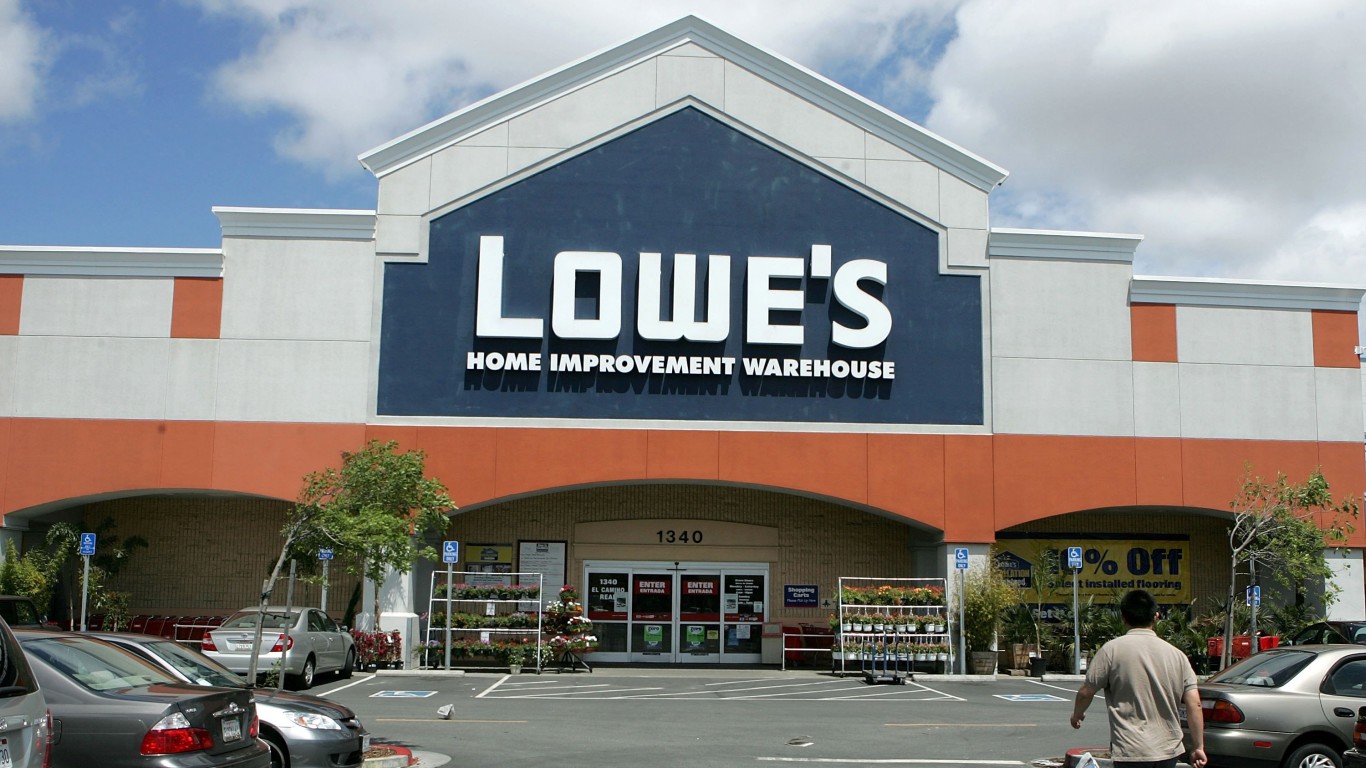Investing
Dividend King Lowe's Just Paid Investors: Here's How Much They Got

Published:

24/7 Wall St. Insights
Lowe’s Companies Inc. (NYSE: LOW) is rewarding its shareholders once again with a quarterly dividend of $1.15, payable on Wednesday, Nov. 6. The company lowered its full-year guidance with the most recent quarterly report, blaming a soft housing market. However, the dividend payment underscores the management’s commitment to delivering consistent value to investors.

Investors favor dividend stocks for two main reasons. The first is that they offer enticing total return potential. Total return is a comprehensive measure of investment performance that includes interest, capital gains, dividends, and distributions realized over time. In other words, the total return on an investment or a portfolio consists of income and stock appreciation. It is one of the most effective ways to boost the prospects of overall investing success.
Dividend stocks can also provide investors with a steady, reliable stream of passive income. Passive income is money that is earned with little to no ongoing effort, usually from assets that generate cash flow. This income can come from a variety of sources, including stock dividends. Generating passive income is a desirable financial strategy for those seeking to diversify their income streams or achieve financial independence.

Lowe’s has a reputation for being a stable and dependable stock. It has not only paid out but has increased its dividend annually for 52 years. That is well more than the 25 straight years of growth it takes for an S&P 500 member to become a Dividend Aristocrat. It makes the stock a Dividend King, a member of that exclusive group of stocks that have at least 50 consecutive years of dividend growth.
Since 2010, the Lowe’s dividend has grown about 1,178%. The current dividend yield is 1.7%, which is less than the average yield of the consumer cyclical sector. The share price has grown by about 1,200% since 2000 as well, offering investors growth along with the income.

This U.S. big-box home improvement retailer offers a line of products for construction, maintenance, repair, remodeling, and decorating. It also provides home improvement products, such as appliances, seasonal and outdoor living, lawn and garden, lumber, kitchens and bath, tools, paint, millwork, hardware, flooring, rough plumbing, building materials, décor, and electrical. Furthermore, the company offers installation services through independent contractors in various product categories and extended protection plans and repair services. It sells its national brand-name merchandise and private brand products to professional customers, homeowners, renters, businesses, and governments. The company also sells its products through its website and mobile applications.
Its headquarters are in Mooresville, North Carolina, which is part of the Charlotte metropolitan area. The company was founded in 1921 by Lucius Smith Lowe. Lowe’s went public in 1961. Its main rival is Home Depot Inc. (NYSE: HD), but it also competes with Walmart Inc. (NYSE: WMT), Amazon.com Inc. (NASDAQ: AMZN), and other big-box retailers.
The long-awaited Federal Reserve interest rate cuts were expected to provide a boost to Lowe’s and Home Depot. Earnings reports scheduled for mid-November will show if that has happened. Lowe’s has also pledged billions for hurricane relief. Earlier in the year, it bowed to activist pressure and scaled back its diversity, equity, and inclusiveness initiatives.

The share price has grown more than 136% in the past five years, outperforming the S&P 500 in that time. In the past 90 days, the stock is up over 13%, while the S&P 500 has gained less than 12%. Shares recently hit an all-time high of $287.01. That is higher than the current mean price target. Post-earnings target changes by analysts could change that picture. TD Cowen and Truist Securities each reiterated a Buy rating recently. Analysts overall cautiously recommend buying shares. Here too, sentiment could change, depending on the upcoming results.
Institutional investors hold about 77% of the shares. BlackRock, JPMorgan, and Vanguard have notable stakes. About 567 million shares, or a bit over 1% of the float, are held short. Note that some executives recently parted with shares.
Three Dividend Kings to Buy for Big Long-Term Total Returns
Thank you for reading! Have some feedback for us?
Contact the 24/7 Wall St. editorial team.